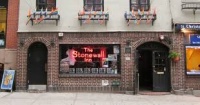Stonewall Icons
If one is looking to mark the beginning of LGBTQ activism in the contemporary era, it begins with the Stonewall Riots that occurred in New York City in 1969. Though there were LGBTQ organizations around the world prior to this event and there existed newspapers, magazines, and a cultural milieu catering to the community, these tended to be comparatively small, generally unnoticed by the public at large, on the fringes of society, or mostly underground activities.
A representation of the growth of the LGBTQ community in the 1960s was the more public existence in America and elsewhere of LGBTQ gathering sites, including LGBTQ bars and clubs. Nevertheless, these clubs and bars were routinely raided, and its clientele arrested and charged with violating public decency laws. As the practice of raiding and arresting grew in frequency in tandem with the growth of the existence of such establishments, the patience of the LGBTQ community became taxed. Nerves became strained at this apparent violation of what was beginning to be viewed as a basic right to gather and associate with like-minded individuals.
When the New York City police raided the Stonewall Inn at 53 Christopher Street on the night of June 28th, 1969, this frustration turned a routine raid on a gay bar into a riot.
Active protest continued throughout the week in the city, spread to other large cities in America, and its influence began to spread quickly around the world. The Stonewall Riot is now considered one of the signature events symbolizing the creation of the contemporary gay liberation movement that had been simmering and growing throughout the 1950s and 1960s.
Within months of the riot, chapters of the Gay Liberation Front had been established across the United States as a radical group that aligned itself with other marginalized and oppressed groups. An identical organization was created in the United Kingdom in 1971. Australia’s first homosexual action group, CAMP (Campaign Against Moral Persecution) was established in 1970 followed by Society Five in 1971. Canada’s first public protest for gay rights, We Demand, occurred in 1971, and the left-leaning Front homosexuel d'action révolutionnaire was formed in France (subsequently morphing into the CUAHR). The Campaign For Homosexual Law Reform began in Ireland and Northern Ireland around the same time.
This organized activism started to lead to several other important developments and advances for the global LGBTQ community. In 2016, President Barack Obama named the Stonewall Inn as the country's first national monument to lesbian, gay, bisexual and transgender (LGBT) rights.
It would not be possible to identify every individual involved in the Stonewall riots, but several stand out as notable and representative of them all. We have identified the following individuals who participated in the Stonewall riots and have left a lasting impact on the community.
- Virginia Apuzzo
- David Carter
- Storme DeLarverie
- Williamson L. Henderson
- Brenda Howard
- Miss Major Griffin-Gracy
- Jerry Hoose
- Marsha P. Johnson
- Thomas Lanigan-Schmidt
- Richard Leitsch
- Sylvia Rivera
- Craig Rodwell
- Doric Wilson
See Also
- Intersex Activists
- Transgender Activists
- Bisexual Activists
- Global LGBTQ HIV/AIDS Activists
- Early European LGBTQ Activists
- Feminist Activists Who Identify as Lesbian, Bisexual or Transgender
- Animal Rights Activism and the LGBTQ Community
- Peace Activists Who Identify as LGBTQ
- Prominent Members of ACT UP
- The Bloomsbury Group in LGBTQ History

